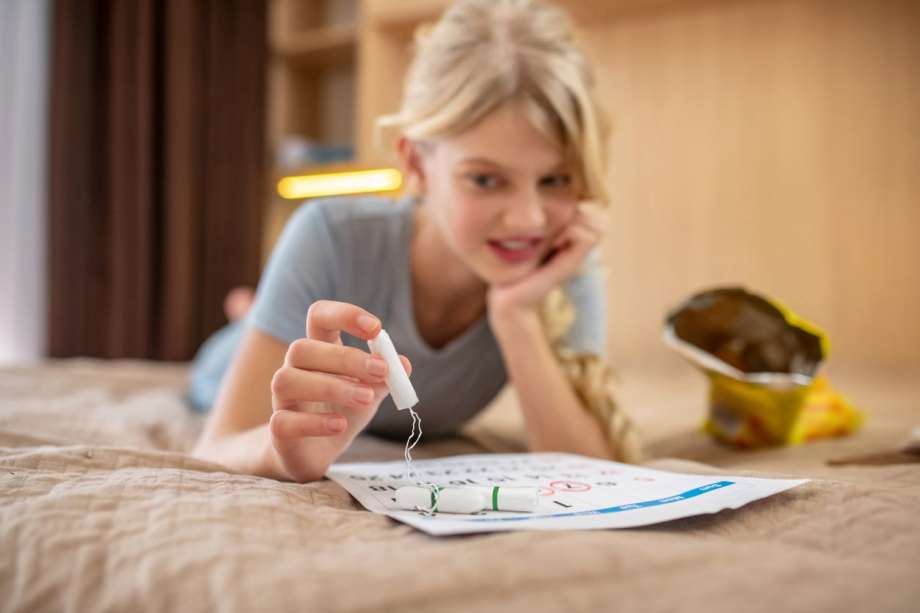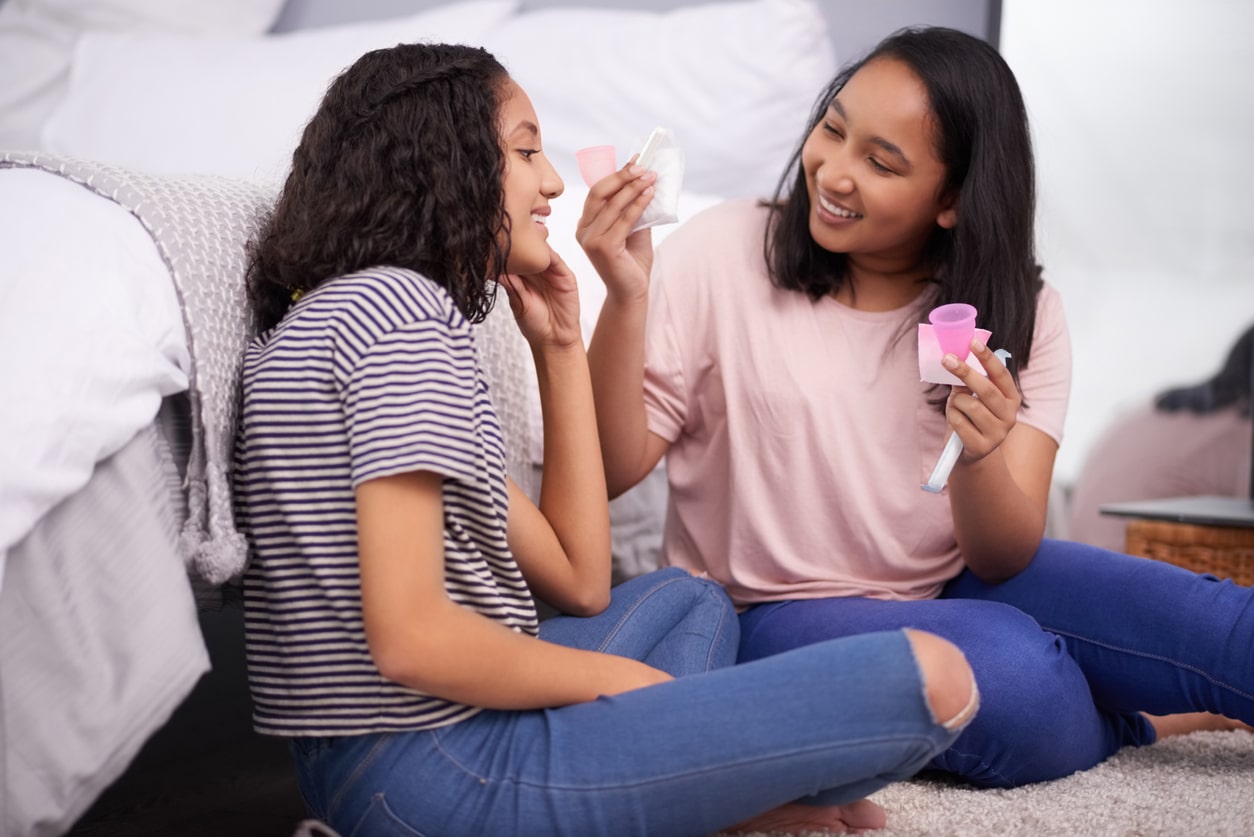How to Talk to Kids About Periods at Every Age

Having a child start puberty can make parents nervous. Aside from bringing up our own memories of awkward adolescence, many parents have no idea how to help their tweens and teens navigate these big transitions in their physical and emotional development.
Some parents may view talking about periods or menstruation with their kids as uncomfortable or awkward. For many young girls and tweens, getting their period can also be a big source of anxiety.
Related: Should I Throw My Teen Daughter a Period Party?
How to Teach Kids About Periods and Menstruation
Although your child may not be going through puberty, they are curious and capable of learning about their changing body. They may have questions or concerns about physical changes. It’s important to provide age-appropriate information and use simple, clear language when discussing these topics.
We spoke with Joanna Griffiths, Founder and President of Knix and Kt by Knix, the direct-to-consumer intimate apparel brands reinventing intimates to give people more period freedom. In September 2023, Joanna launched “Some Periods,” a groundbreaking book set to revolutionize early menstrual education for kids.
As a menstruation expert, Griffiths believes it’s important parents know how to have these conversations in non-judgemental, open and supportive ways.
This article will provide you with tools to address the social stigma of starting your period, offer tips on having the “first-period conversation” with your child, and provide resources to teach kids about periods and menstruation.
What Age Should You Talk to Kids About Periods?
The right age to have the period talk varies from child to child and can depend on their individual development, maturity, and curiosity. However, it’s generally a good idea to begin discussions about puberty and menstruation before it actually occurs.
Every tween or teen’s body is different; their first period (menarche) may occur at different ages. Typically, the first period can occur at any time between 10 and 15 years of age. The average age for periods to start is 12 years old.
Giving them reliable information from trusted sources can help prepare adolescents for when their period starts, prevent misconceptions and reduce any anxiety or confusion they might feel with these body changes.
For some families, the topic may come up if your young child sees their mom or an older sibling use period products and becomes curious about them. This is a great learning opportunity to help start the conversation about menstruation. Encourage the following messages to normalize getting periods:
- Getting a period is normal. There is nothing weird about it.
- Although there is blood, it doesn’t always hurt.
- Sanitary pads, tampons, menstrual cups and period underwear are types of products that help us take care of it.
We asked Joanna about what age is it appropriate to talk to kids about menstruation. She believes this topic can be broached with children as young as 4 years of age.
“My book 'Some Periods' was designed to educate children about their bodies, how they work and prepare for puberty. This book was designed as a resource for children as young as 4 years old and into their teens,” she explains.
Removing the Social Stigma Around Periods
A 2021 study titled “State of the Period" looked at the widespread impact of period poverty on US students. The survey included 1010 students who menstruate between the ages of 13 to 19. It asked the participants about the stigma around periods and showed the following results:
- 76% of students say there is a negative association with periods and that they are gross and unsanitary.
- 65% agree that society teaches people to be ashamed of their periods.
- 70% say the school environment makes them especially self-conscious of their periods.
- 83% hide their period products when they walk out of class to go to the bathroom.
- 65% do not want to be at school when they have their periods.
- 38% often or sometimes cannot do their best schoolwork due to lack of access to period products.
- 62% agree the world is not set up for them to manage their periods with full confidence.
- 58% of students are negatively affected by negative associations with periods.
We asked Joanna what the best way to normalize periods and reduce the social stigma around menstruation:
“The best way to reduce social stigma around menstruation is to talk about it. And that’s exactly why we created this book! This book was born out of a desire to avoid shying away from talking about periods. When we shy away from this, we send the message that periods are shameful or gross.
"Some Periods" intends to take the confusion, embarrassment and misinformation about periods and use this book to empower people to bleed with confidence. Because if half of the population is experiencing periods, there is nothing we should be ashamed of.”
Tips to Help Your Daughter with Her First Period
Preparing your daughter for her first period is an important step in helping her navigate this significant milestone with confidence and understanding. Here are some tips to help you prepare her:
-
Start Early
It’s a good idea to start the conversation before the first time she gets her period. Girls typically start menstruating between the ages of 10 and 15, so initiating conversations about puberty and menstruation around age 8 or 9 can be helpful.
-
Choose the Right Time
Find a quiet, comfortable, and private setting to talk to your daughter. This will make her feel more relaxed and open to discussing personal topics.

-
Use Simple Language
Explain menstruation in simple and age-appropriate language. For instance, you can explain the menstrual cycle, what ovulation is, what ovaries are and that a period occurs when the lining of the uterus sheds. Avoid using overly medical terms unless she expresses an interest in learning more about women’s health.
-
Use Educational Resources
Consider using books, pamphlets, reliable information from social media accounts and/or online educational videos designed to teach young girls about puberty, PMS and menstruation. Make sure they include illustrations and straightforward explanations.
-
Discuss the Basics
Cover the basics of what menstruation is, why it happens, how long it lasts, and what to expect. Talk about some of the symptoms she may experience such as bloating, cramping, vaginal discharge, tiredness and headaches. Explain that it’s a natural part of growing up and that it signifies her body is maturing.
-
Address Emotional Aspects
Talk about the emotional and psychological aspects of menstruation such as PMS. Let her know that it’s normal to have mood swings and emphasize the importance of taking care of her mental health and wellness during this time of the month.
-
Explain Menstrual Hygiene
Teach her about menstrual hygiene practices. Show her how to use pads, tampons, menstrual cups and/or period underwear. Explain which ones are reusable and which ones need to be disposed of. Discuss hygiene routines to prevent discomfort or infections.
-
Be Supportive
Reassure her that you’re there to support her throughout this process. Let her know that she can come to you with any questions or concerns.
-
Encourage Questions
Be open to questions and provide honest, accurate answers. If you don’t know the answer to something, offer to look it up together or consult a healthcare professional.
-
Normalize the Experience
If you’re comfortable, you can share your own stories to help normalize the experience and make her feel less alone.
-
Consider a Period Kit

As her first period approaches, consider creating a period kit together. Include sanitary pads, a spare change of underwear, and instructions for use. Having this ready can reduce anxiety when the time comes.
-
Keep Communication Open
Maintain open and ongoing communication about menstruation and related topics. Encourage her to share her experiences, and check in with her regularly to see how she’s feeling.
Remember that everyone’s body is different, and the level of detail you provide should be tailored to her maturity level and curiosity. The key is to create a safe and supportive environment where she feels comfortable discussing menstruation and any concerns that may come up.
How Dads Can Talk to Daughters About Periods
Some dads may feel less equipped to talk to their daughters about menstruation but it’s still an important conversation to have. If you don’t feel completely comfortable, you can ask a family member, close friend or healthcare provider to help you.
We asked Joanna for her advice for dads talking to their daughters about periods.
“The first piece of advice I would give to dads is to get educated on the topic — there are lots of great resources online including this book and the period guide that KtByKnix launched last year. I would also encourage people to have conversations earlier rather than later as kids are getting their periods younger and younger. Perhaps the most important piece of advice I have is to relax and approach the topic much like you would anything else. This will go a long way in ensuring that your child feels comfortable.”
How to Talk to Boys/Non-Menstruating People About Periods
Talking to those who do not experience periods is an important conversation that can help everyone understand, normalize and respect the experiences of people who menstruate.
Here are some steps to guide you through this conversation:
-
Be Prepared
Educate yourself about menstruation so you can provide accurate information. Anticipate questions they may ask and be ready to answer them.
-
Keep It Age-Appropriate
Tailor the conversation to your son’s age and maturity level. Younger children may need simpler explanations. Explain menstruation using clear and simple language. You can say something like, “Sometimes, people with female bodies have a monthly cycle where they bleed from their uterus. It’s a natural and healthy process.”
-
Promote Empathy and Respect
Emphasize the importance of understanding and respecting people who menstruate. Explain that it can sometimes be uncomfortable or even painful, so being supportive and compassionate is crucial.
-
Share Books or Resources
Consider providing books or resources designed for children or teenagers that explain menstruation. We recommend looking for books to teach boys about puberty and books to teach girls about puberty as a good intro to the topic of periods and menstruation for both boys and girls.
-
Normalize It
Help your son understand that menstruation is a normal part of life and not something to be embarrassed or ashamed about.
-
Discuss Menstrual Hygiene
Show him what menstrual products look like, how they work, and why those who have periods use them. Framing these products as something as simple as using toilet paper after going to the bathroom or using a Q-tip to clean your ears, helps kids understand it as just another part of a basic hygiene routine – nothing that needs to be hidden or kept secret.
-
Encourage Open Communication
Encourage your son to ask questions. Answer honestly and age-appropriately. Let him know that he can always come to you with questions or concerns in the future.
Remember that this conversation might be a bit awkward at first, but it’s a vital step in your child’s education and development. By approaching it with understanding and openness, you can help reduce stigma and promote empathy.

